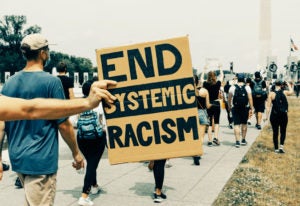 Last September, the Hogg Foundation issued a unique statement: a Declaration of Racism as a Mental Health Crisis. Its purpose is to call attention to the link between racial justice and mental health, and to argue that racism undermines our collective health and well-being. More than 200 organizations, including non-profits, cities, and public health associations, have co-signed this document. This episode of Into the Fold features a discussion with our three guests, each an esteemed figure in the world of public health: Josè Ramón Fernández-Peña, President at the American Public Health Association (APHA), Dr. J. Nadine Gracia, executive vice president at Trust for America’s Health (TFA), and our own Dr. Octavio N. Martinez, Jr., executive director of the Hogg Foundation. Together we talk about the Declaration, and how a broad effort to take its goals to heart can shape all our futures for the better.
Last September, the Hogg Foundation issued a unique statement: a Declaration of Racism as a Mental Health Crisis. Its purpose is to call attention to the link between racial justice and mental health, and to argue that racism undermines our collective health and well-being. More than 200 organizations, including non-profits, cities, and public health associations, have co-signed this document. This episode of Into the Fold features a discussion with our three guests, each an esteemed figure in the world of public health: Josè Ramón Fernández-Peña, President at the American Public Health Association (APHA), Dr. J. Nadine Gracia, executive vice president at Trust for America’s Health (TFA), and our own Dr. Octavio N. Martinez, Jr., executive director of the Hogg Foundation. Together we talk about the Declaration, and how a broad effort to take its goals to heart can shape all our futures for the better.
Why a Declaration?
The idea for this the Declaration came from the Hogg Foundation’s most recent meeting with its National Advisory Council (NAC). During this meeting, which took place during the summer of 2020 against the backdrop of a global pandemic and nationwide protests calling out systemic racism and police violence, we clearly saw the deep-seated inequities that exist in our country. Together, we determined that in this moment, while many organizations were acknowledging the impact of racism on public health, no one else had singled out mental health as a crucial piece of the puzzle.
“I feel that we are in a moment of awakening,” says Dr. Martinez. “If there’s a silver lining to this pandemic, it really laid bare our gaps, our challenges, the existing disparities, and the inequities that definitely exist.”
Why Mental Health?
Dr. Fernández-Peña only recently learned about the Hogg Foundation’s declaration, but he is a veteran of public health and issues of structural inequities. “A couple of things strike me about the Declaration,” says Dr. Fernández-Peña. “One of them is the calling out of the fact that racism is, in fact, a mental health crisis, as well.” While many organizations have talked about the impact of continued racist experiences on physical health — for example, pregnant mothers who have high levels of cortisol in their bodies, and how that relates to infant mortality rates among African American women — fewer explicitly talk about the impact of racism on mental health. “I think for all of us in the health sector in general, especially in the public health sector, we are really shifting the conversation from calling race a factor in mental health and switching that into naming racism as a factor that actually has a significant impact on health outcomes across the communities that have been historically oppressed.”
While issues of parity may not prevent someone from getting their tooth pulled by a dentist who doesn’t know their language or culture, it creates a huge roadblock for providing adequate mental health care, which requires deep conversations. Dr. Fernández-Peña experienced this firsthand many years ago, when he was seeking support during a difficult time. “I feel in Spanish. I need to convey those feelings in Spanish,” he explains. He was surprised to find that his HMO provider could speak perfect Spanish, which is not always the norm. “I was able to find the services I needed because I was very, very lucky”.
Envisioning an Equitable World
Dr. Gracia emphasizes that our current systems of care do not provide everyone with the same opportunities to live and grow to their highest potential. “When I think about health equity,” she says, “I think about ensuring that the systems themselves promote equity and opportunity for everyone, not just by luck.” She says it is society’s responsibility to ensure the conditions are there for this to be possible.
Asked to envision a world where health equity is achieved, all three guests have their cherished goals. Dr. Fernández-Peña imagines a system where access to health services is not contingent on employment. For Dr. Martinez, that world would see an end to infant mortality — and that there would no longer be any identifiable differences in infant mortality between races. Dr. Gracia echoes this, saying that she imagines an equitable world would be one where “a child is born and their life isn’t determined by racism, zip code, income status.” This world would include, adds Dr. Fernández-Peña, a health workforce that reflects “the richness of the population they aim to serve,” meaning doctors and other health care providers would be versed in cultural humility, and that more diverse individuals enter into those fields and are able to excel.
“This is a time and an opportunity where we can really elevate not only our understanding, but also start implementing the change that needs to happen,” says Dr. Martinez. “I want to end with that amazing word: hope. There is hope, and we can ensure equity for all.”
